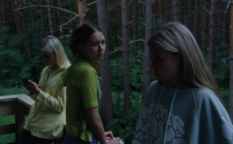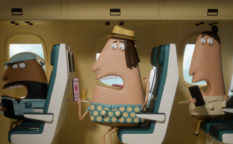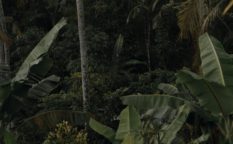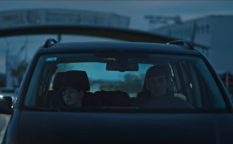Daniel Hadenius-Ebner: “Homecoming to the MuseumsQuarter was a big step for us”
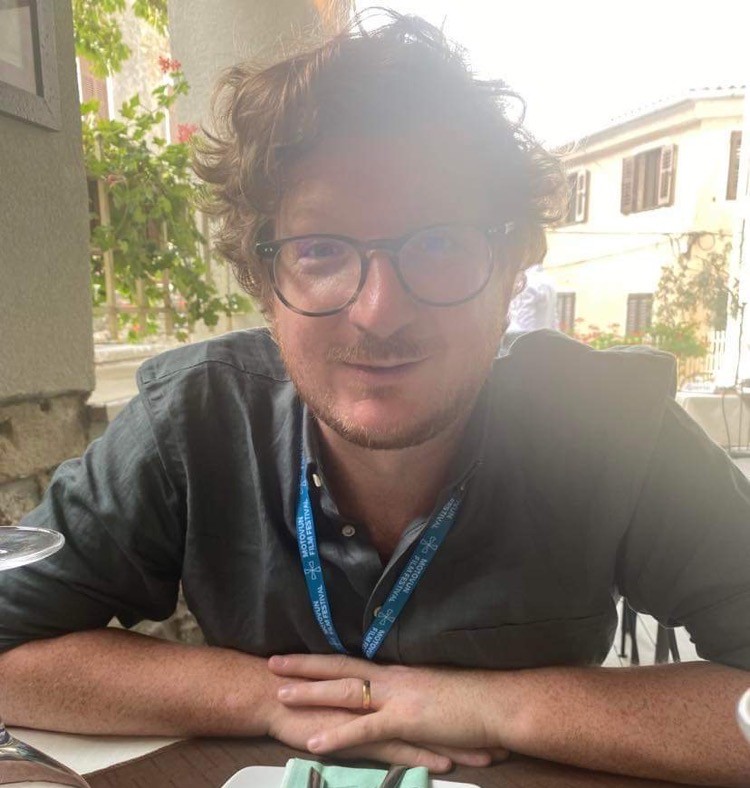
Right before the interview, we asked Daniel Hadenius-Ebner to present himself in his own words to those few people in the international short film circuit who don’t know much about him, and here is what he wrote:
Daniel Hadenius-Ebner (42), born in Vorarlberg, married in Sweden, forever connected to Vienna.
Loves silly movies and experimental stuff, has a soft spot for football and snooker, is into good journalism and great architecture, likes to work his ass off for his job but also to leave all his cares behind in Italy afterwards, and can hardly imagine a life without Bassethound Eliza. (We can confirm that Eliza was present, and that she wasn’t keen on giving a statement).
2023 is Daniel’s 20th edition with the short film festival Vienna Shorts, which is one of the reasons Ubiquarian met him for an interview.
We’re approaching the 20th jubilee of Vienna Shorts which comes with big novelties, and some great news. One of them is related to two new awards that will be handed out for the first time.
Yes, we are very happy about that. Our long-time partners, the post-production companies Blautöne and ViennaFX, have initiated a new award for best sound in the Austrian competition – which makes us very happy, because sound is such an incredibly important part of filmmaking. In the international competition, on the other hand, the Austrian Association of Cinematographers (AAC) will award a prize for best image design. It’s the first time that we have awards that don’t honor the entire film, but are specifically dedicated to two essential filmmaking skills.
The award budget raise from 25.000 to 30.000€ is also something more than worth mentioning.
Absolutely, and it happened only thanks to our long-standing partners. The animation association ASIFA Austria, for example, has raised the prize money for the Animation Avantgarde competition, the professional association for the film and music industry in Vienna (FIMU) is giving 2.500€ for the best music video instead of 1000€ in previous years, and so on. On the one hand, they wanted to cover the inflation gap, but on the other hand they also wanted to support our anniversary. We are quite happy with that development.
There is other exciting news, such as the increased number of festival venues.
This is always tricky, to be honest, because any kind of expansion immediately involves a bigger load of work and generally a larger team around it. We therefore approached the expansion very carefully, and above all with venues with which we wanted to enter into partnerships at eye level. With Blickle Kino at Belvedere 21, for example, we immediately pulled together. And without this close collaboration, the portrait programs on US filmmaker Kevin J. Everson might not even have been possible. Then there’s the cinema truck called Milieukino that was in use at Praterstern and can be handled by one person alone. It has 15 seats, a bar, and even a 35mm projector. The whole project is very original and extremely charming. The truck will be parked here at Museum Quarter, and the programme that we show there will be thematically linked to the outdoor programme here around the corner.
You are also preparing a couple of new things for the anniversary festival edition. Can you give us some juicy details?
An anniversary is always interesting, because there will be so many memories and, of course, a million ideas connected to them. We didn’t want to make the festival only about the birthday, but at the same time make sure that we also give something back to the city who has supported us from the very beginning. So on the one hand we decided on offering five outdoor cinema events at MuseumQuarter for free, on the other hand we managed – in collaboration with the City of Vienna – to give free admission for everyone under 20 years of age. Additionally, we prepared a “warm-up” project online in which long-time companions of the festival share their personal memories and favorite films with us. The anniversary is therefore all about creating new collective memories and, as this year’s motto “Just A Moment, Please” indicates, taking a breath before plunging back into the world around us.
When you look back at the past 20 years, what was your most sobering, shocking realization in terms of the development of the festival?
The most shocking thing – and I mean shocking in a positive sense – is definitely the big difference between the beginnings and where we are now, and how the whole project has evolved. Being the only one who was there from the beginning, I can still remember very well how we started as a student project in 2003, how we tried to do things better every year and learn from our many mistakes. It was very much learning by doing, in a grassroots way and without any further knowledge of how a festival should be run. And you really can’t compare it to where we are now, in terms of budget, programme and projects, as we are also firmly established in two major European film festival networks. But it was always a lot of fun – and so when you ask a question like this, so many memories pop up in my head that I don’t even know where to start.
There is one important issue that I would like to address, knowing that one of your focuses this year is the Climate Crisis. Since 2022, Vienna Shorts has the Austrian Eco label. Can you tell us what kind of steps were additionally introduced to make Vienna Shorts greener?
This runs through all areas of the festival, from the entire set-up and waste management, to the organization of travel and transport, to printed materials, digital infrastructure, the handling of collaborations and so much more. It’s a really big amount of work if you want to meet the eco-label criteria to be able to implement and certify so-called “green events”. For example, we have created financial incentives for guests who travel by train or public transport, we have dispensed with a printed catalog and instead have moved all of this to an app, and above all we have been in constant exchange with our venues and cooperation partners in order to initiate various necessary changes there or to come up with alternatives as to how partners can be present on site. And sometimes there are also very tough decisions involved: Do we really want to invite guests from overseas when it is only about one or two Q&As? Of course we would love to have all the filmmakers present, but in the end it is about a certain balance in the CO2 emissions. And this is a constant balancing, because the eco label is not something given that you receive once and then you can just relax – no, a lot of work has to be done each year to maintain the status.
I will now brutally deny you the time to think about the next question, which should be answered as soon as I ask it. What is you heart project of Vienna Shorts 2023?
(The answer came within seconds) The “Homecoming” to the MuseumQuarter. This was a big step for us, because this is where our office has been located since 2007, and now to have the festival center here, the cinema truck and an open air cinema means a world. At the same time, there are some programmes and content that are very close to our hearts, some of them already with a very long tradition such as the late night section. That one is particularly important because there are a lot of people who immediately think about it when you mention Vienna Shorts. We’ve got two new programmers for that section, both also working as curators for the Slash FF: Eva Krenner and Tom Kiesecoms. Therefore it’s also a bit of a new direction
This year’s Vienna Shorts also puts focus on three filmmakers: Kevin J. Everson, Claudrena N. Harold, and Christiana Perschon.
Kevin J. Everson is one of the most productive US filmmakers, who is producing around 20 to 30 films a year, always very short and focussing on black history, black living and working conditions, always from a very special viewpoint and on eye level with the people he meets. He is a very attentive person and a focused filmmaker whom we tried to get to Vienna together with his collaborator Claudrena Harold after he won the award with “Black Bus Stop” at our festival in 2019. But then the pandemic hit in 2020, and we had to postpone and postpone. All the happier we are now that it finally worked out. It might have been a stroke of fate that he will be in Vienna for our anniversary year now, because we wanted to work with him for such a long time. There will be two solo programmes of his at the Blickle Kino, but also additional two in collaboration with Claudrena N. Harold in the Filmmuseum where they will present their films and give a masterclass.
Similarly important for us and very present at the festival over the years is our Austrian guest this year, Christiana Perschon. She won the top prize in the festival’s Austrian Competition ten years ago and received the Austrian Art Award for Film last year, and this year she is now presenting five of her idiosyncratic and wonderful portrait works. I’m really looking forward to that, too!
The children programme has also become a significant segment of Vienna Shorts.
With the introduction of free admission for the audience under 20 years of age, we also decided to put more effort into the kids & youth section. We received so many films that we could have almost made a whole film festival just for kids and young people. Now we have seven programmes for very young and older kids, workshops teaching teenagers over many weeks how to curate their own film programme. There are also programmes for schools, and there are two collaborative projects with the young film club Kino & Krawall (cinema & riot).
Finally, there is a revolutionary step you took to make the award-winning filmmakers being recognized by a larger audience. The mark they leave will be deeper than just receiving a statue.
That’s right. We won’t be giving out trophys anymore. Instead, we will plant trees all over Vienna with the help of the City’s Garden Directorate. Those trees will be labeled with the name of the film, the director, and the award, and there will be a QR code that can be scanned and used to watch the film in that area. You will basically have the opportunity to have a short film walk through Vienna, and this project is supported by the city councilors Jürgen Czernohorszky and Veronica Kaup-Hasler. Both of them love the project. Instead of dead wood, we wanted to offer the winning filmmakers a living testimony of their achievement, to see them growing and being rooted in the city, and to make their work visible to the greater audience.













